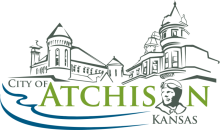We’re committed to being a prepared community which means planning ahead.
Natural Disasters
In a major disaster like a tornado, our citizens need to be able to be on their own for two to five days. During day-to-day operations of emergency services we are used to response times of minutes. In a major disaster, emergency services will be overwhelmed and responses will be prioritized, which may mean no one will be in your neighborhood for days. Therefore, you need to prepare to take care of yourself, your family and your business.
Atchison County Emergency Management has a comprehensive emergency management plan which outlines how the County, in cooperation with the City, will respond to a disaster or emergency. Does your family have an emergency plan?
Planning Ahead
Where will your family be when disaster strikes? They could be anywhere … at work … at school … in the car. How will you find each other? Will you know if your children are safe?
Disaster can strike quickly and without warning. It can force you to evacuate your neighborhood or confine you to your home. What would you do if basic services — water, gas, electricity, or telephones — were cut off? Local officials and relief workers will be on the scene after a disaster but they cannot reach everyone right away.
Families can and do cope with disaster by preparing in advance and working together as a team. Knowing what to do is your best protection and a personal responsibility. Use these resources for preparedness tips.
Find more amazing resources at www.ready.gov.
If a Disaster Happens:
- Remain calm and patient. Put your plan into action.
- Check for injuries.
- Give first aid and get help for seriously injured people.
- Listen to your battery powered radio for news and instructions. Tune to KAIR Radio 93.7.
- Evacuate if advised to do so. Wear protective clothing and sturdy shoes. You may also be asked to “Shelter-in-Place.”
- Check for damage in your home.
- Use flashlights — do not light matches or turn on electrical switches if you suspect damage.
- Check for fires, fire hazards, and other household hazards.
- Sniff for gas leaks starting at the water heater. If you smell gas or suspect a leak turn off the main gas valve, open windows, and get everyone outside quickly.
- Shut off any other damaged utilities. If not damaged, you may leave utilities on.
- Clean up spilled medicines, bleaches, gasoline, and other flammable liquids immediately.
- Locate your 72 hour kit or preparedness supplies and put them in a safe location.
Remember to:
- Confine or secure your pets.
- Call your family contact – Use your cell phone sparingly to conserve the battery’s charge.
- Check on your neighbors, especially elderly or disabled persons.
- Make sure you have an adequate water supply in case service is cut off.
- Stay away from downed power lines.
- Do not turn on utilities. That should only be done by a trained utility employee.
Other Information:
- 12 Points to Preparedness
- Utilities During an Emergency
- Emergency Lighting Checklist
- Shelter-In-Place
- Evacuating During a Disaster
- Emergency Supply Kit
- Home Daycare Fire Safety Checklist
